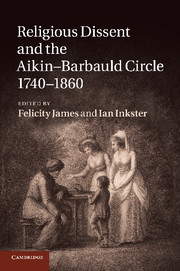Book contents
- Frontmatter
- Contents
- Notes on the editors and contributors
- Foreword
- Acknowledgements
- Chapter 1 Religious Dissent and the Aikin–Barbauld circle, 1740–1860
- Chapter 2 The Revd John Aikin senior
- Chapter 3 How Dissent made Anna Letitia Barbauld, and what she made of Dissent
- Chapter 4 ‘And make thine own Apollo doubly thine’
- Chapter 5 ‘Outline maps of knowledge’
- Chapter 6 ‘Under the eye of the public’
- Chapter 7 ‘The different genius of woman’
- Chapter 8 Lucy Aikin and the legacies of Dissent
- Chapter 9 The Aikin family, retrospectively
- Bibliography
- Index
- References
Chapter 3 - How Dissent made Anna Letitia Barbauld, and what she made of Dissent
Published online by Cambridge University Press: 05 November 2011
- Frontmatter
- Contents
- Notes on the editors and contributors
- Foreword
- Acknowledgements
- Chapter 1 Religious Dissent and the Aikin–Barbauld circle, 1740–1860
- Chapter 2 The Revd John Aikin senior
- Chapter 3 How Dissent made Anna Letitia Barbauld, and what she made of Dissent
- Chapter 4 ‘And make thine own Apollo doubly thine’
- Chapter 5 ‘Outline maps of knowledge’
- Chapter 6 ‘Under the eye of the public’
- Chapter 7 ‘The different genius of woman’
- Chapter 8 Lucy Aikin and the legacies of Dissent
- Chapter 9 The Aikin family, retrospectively
- Bibliography
- Index
- References
Summary
I begin with a few words of personal and national biography. When I visited England in 1988 to begin research for a new life of Anna Letitia Barbauld I was reviving a tradition of Americans making pilgrimage in her honour. Before me, in 1873, came Grace Ellis, New England feminist and advocate of women’s education. She published two books about Barbauld, whom she regarded as nothing less than ‘one of the great minds which belong to all time’. Fifty years before Ellis, in 1822 when Barbauld was still alive to receive him, came the leading voice of New England Unitarianism, William Ellery Channing. He had read Barbauld in childhood and revered her: ‘I owe to her more than delight’, he wrote to Barbauld’s niece Lucy Aikin after Barbauld’s death. Some fifteen years before him came another New England Unitarian, the Reverend Joseph Stevens Buckminster; and in 1812 Barbauld answered a fan letter from an American girl named Harris.
My interest in Barbauld was thus congruent with Barbauld’s reception in the early United States. She came to print there only thirteen years after her literary debut at home: her Hymns in Prose for Children in 1786, her Lessons for Children in 1788, the latter printed in Philadelphia by a grandson of Benjamin Franklin. For thirty years thereafter, editions of her books for children poured from presses in Boston, New York, Philadelphia and lesser towns. New England Unitarian William Peabody could claim in 1826 that ‘thousands look back [to Hymns in Prose] as the source of much happiness and devotion’. In a notebook remark about teaching manners to children Ralph Waldo Emerson recalled that ‘Mrs Barbauld said, they should never remember the time when they knew not the name of God’. Emerson, aged 47 when he wrote this, was remembering Hymns in Prose. Bronson Alcott, father of the author of Little Women, taught religion to children in 1830s Boston and recorded what the children said about it. Seven-year-old Josiah Quincy read Hymns in Prose enthusiastically, and one day in class he ‘burst out’, ‘Mr. Alcott! you know Mrs. Barbauld says in her hymns, everything is prayer; every action is prayer; all nature prays; the bird prays in singing; the tree prays in growing.’ Josiah understood Hymns better than many a later commentator on it.
- Type
- Chapter
- Information
- Publisher: Cambridge University PressPrint publication year: 2011
References
- 2
- Cited by



